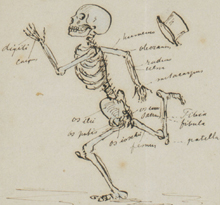Frederik van Eeden > About the collection
The main part of the collection comes from Van Eeden's heirs, who gave it on loan to the Van Eeden Society in 1954; the collection has been supplemented with documents donated by third parties. Since 1935, the collection has been administered by the Amsterdam University Library and it is now part of the library's Special Collections.
Life and Works
The Frederik van Eeden Society's collection includes material from and about Van Eeden in the broadest sense of the word. It covers all the areas in which he was active and contains abundant source material and documentation in each and every one of these fields.
Van Eeden's physical presence is very nearly palpable in the manuscripts of his literary work, his diaries, the accounts he wrote of his dreams, his sketchbooks, the photographs that have been preserved of him and his loved ones and the letters he wrote. This applies just as much to his personals belongings, like the rosary symbolizing his conversion to Roman Catholicism.
Portrait of an era
Moreover, there are the great many letters Van Eeden received from his numerous correspondents: relatives, but also a large number of celebrities both in and outside the Netherlands, among whom Martin Buber, Sigmund Freud, Peter Kropotkin, Walther Rathenau, Rainer Maria Rilke, Upton Sinclair and Rabindranath Tagore. Their names illustrate Frederik van Eeden's significance in that era.
In addition to its importance for gathering information on the life and works of Frederik van Eeden, the collection is also a valuable resource for the biographies of the numerous persons with whom he was in contact. Of the many social initiatives Van Eeden launched or supported, the Walden Colony is particularly well documented. More broadly speaking, the collection gives an insight into the time and cultural context in which Van Eeden and his contemporaries lived.
Preservation and digitization
Almost the entire collection was preserved and put on microfilm in 1998-2000 within the framework of Metamorfoze, the national program for the preservation of the Dutch paper heritage. As a matter of principle, and in accordance with the stipulations of Metamorfoze, the original documents have no longer been available for perusal since the project was completed. It is, however, possible to view them on microfilm in the Special Collections study hall of the Amsterdam University Library on Oude Turfmarkt 129 in Amsterdam.

